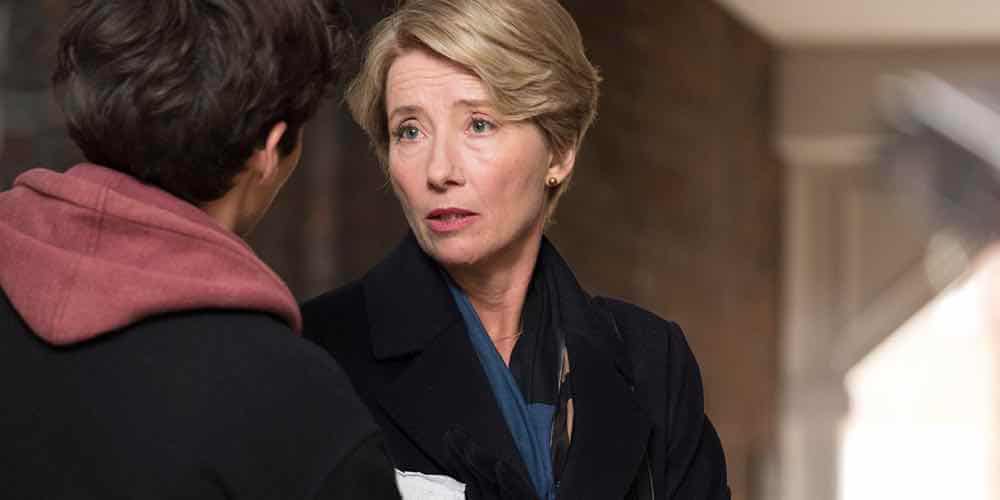Richard Eyre’s The Children Act, starring Emma Thompson, is a strong adaptation of one of Ian McEwan’s lesser novels.

People orbit around High Court Judge Fiona Maye (Emma Thompson) in Richard Eyre’s The Children Act. This screen adaptation was penned by Ian McEwan based on his novel. In the film’s opening scene, Fiona’s husband Jack (Stanley Tucci) walks in and out of her study, trying to get her attention. She’s seated at her desk, her back turned to the camera and to him. At first, he’s simply trying to talk to her while she half-listens. Once he announces his sudden desire to have an affair, he gets her attention. Jack’s dramatic entrances and exits, while Fiona remains in place, are Eyre’s way of translating theatre blocking onto the screen: you can feel his helplessness and her power by who has to move. Even this discussion of marital infidelity effectively happens on her terms.
As a judge, people assemble in Fiona’s courtroom like an audience; she knocks on the door to enter at the last minute. Thompson’s Fiona is a no-nonsense intelligent professional. She speaks quickly and precisely, and she’s prone to interrupt counsel if they’re insulting her intelligence. People above and below her constantly make demands on her time and attention. Her coping strategy: stay polite, give the minimum attention required, and get out quickly. But it’s started to bleed into and take its toll on her marriage. She hasn’t had time for Jack — or to have those kids he wanted.
You can feel the plot gears shifting into place as Fiona receives a new case: a 17- year-old Jehovah’s Witness, Adam (Fionn Whitehead), is refusing the hospital’s recommended blood transfusion necessary for his leukemia treatment. This could kill him. The irony that Fiona presides over Children’s Court but has none of her own lands like an anvil, and her newfound marital discord leave her vulnerable to treating this case differently. The parents insist that Fiona meet their son, and she acquiesces.
[clickToTweet tweet=”‘For the first time, Fiona is going to someone else rather than having him come to her.'” quote=”‘For the first time, Fiona is going to someone else rather than having him come to her.'”]
Although Fiona’s clerk and colleagues don’t treat her visit as particularly strange or unnecessary, Eyre’s direction signals it’s an exception to the rule. For the first time, Fiona is going to someone else rather than having him come to her. By the end of the meeting, in which she struggles to maintain her professional distance, he’s playing the guitar, and she’s singing along.
Rather than dwell on Fiona’s decision, which we learn was pretty much already written before the case began, the film deals with its aftermath. When Fiona saves Adam’s life, it sparks his crisis in faith and a transference of emotions to Fiona, whom he starts to see as a substitute mother — and possibly something more romantic. So he stalks her, in search of further connection and answers. She responds with her usual careful detachment: reminding him it’s inappropriate, that she was merely doing her job, that it wasn’t personal. She wants to know what he wants from her; he wants to know what she wanted from him, why she broke protocol and made a point of meeting him.
[clickToTweet tweet=”‘She wants to know what he wants from her; he wants to know what she wanted from him, why she broke protocol.'” quote=”‘She wants to know what he wants from her; he wants to know what she wanted from him, why she broke protocol'”]
The Children Act is more interested in raising questions about why the characters have crossed ethical lines than in suggesting answers. Adam seems capricious in his religious devotion, and McEwan never explores what’s driving this. That’s largely because the film is most invested in Fiona’s perspective, and she doesn’t understand Adam. Fiona makes no attempt to understand her role in sparking Adam’s inappropriate behaviour or take any serious steps to make amends. Ultimately, McEwan is most interested in the effect of the case on Fiona’s marriage, rendering Adam’s life a plot device and therefore disposable — which Fiona herself refused to let it be.
[clickToTweet tweet=”‘It’s somewhat puzzling why McEwan and Eyre chose to adapt this novel for the screen.'” quote=”It’s somewhat puzzling why McEwan and Eyre chose to adapt this novel for the screen.”]
Aside from providing a complex role for a great actress, it’s somewhat puzzling why McEwan and Eyre chose to adapt this novel for the screen. Reviews of McEwan’s book almost unanimously said some version of “McEwan is a great writer — except for this one story, in which Adam is too simplistically rendered.” McEwan doesn’t deepen Adam’s characterization for the film. Nevertheless, Thompson’s Fiona is highly intelligent and compassionate. When Fiona causes her clerk to spill the tea and cookies he brought her as she swipes her phone, Eyre invites us to wonder if she really is the heartless bitch her husband implies she’s becoming. Yet the first thing Fiona asked for when hearing Adam’s case is for his name, to humanize him and render him real.
[clickToTweet tweet=”‘Even in two-shots with Thompson, I found myself sometimes looking at Fionn Whitehead—no easy feat.'” quote=”‘Even in two-shots with Thompson, I found myself sometimes looking at Fionn Whitehead—no easy feat.'”]
Whitehead, who shot to sudden fame as the lead in Dunkirk, is equally compelling here as Adam. Even in two-shots with Thompson, I found myself sometimes looking at him — no easy feat. What unites Adam with his Tommy from Dunkirk is their intelligence; Whitehead shows us the wheels turning. We sense that Adam may be the rare match for Fiona. The role as written has its limits, since McEwan is more interested in Fiona’s psychology than Adam’s, but Whitehead leaves us wanting more, wishing (as Fiona ultimately does) that we could get to know him better.

